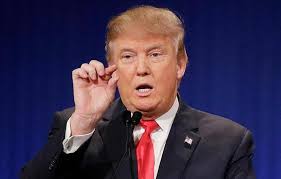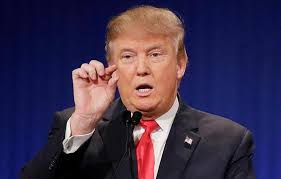
After Republican presidential nominee Donald Trump gave a glimpse of economic agenda in a speech in Detroit on Monday, it is but pertinent to compare his strategy with both the current situation and the ideas from Democratic nominee Hillary Clinton, including some of Trump's main promises so far.
Energy:
President Barack Obama's signature climate actions are sought to be undone by Trump which include cancelation of an international agreement to limit global warming through new environmental standards, grant TransCanada Corp.’s bid to build the Keystone XL pipeline and revoking executive action on carbon emissions. He wants to revive coal and expand offshore drilling. Output of the energy industry could be boosted by $100 billion a year, according his plan, by lifting of restrictions.
The reality is that Obama signed the U.S. to a United Nations pact to curb temperature increases and has rejected Keystone. Obama also used his executive powers to legislate reductions in greenhouse gases emitted by U.S. power plants and all new minning projects o federal land were halted.
Hilary Clinton basically has indicated continuation of Obama's policies with a focus on clean energy jobs and renewable energy. Coal would not be favored by her.
Personal and Corporate Taxes:
Trump wants to reduce the tax rates on businesses and individuals in what he says would be the biggest since Ronald Regan. Consolidating the existing seven individual income tax rates to just three -- at 12 percent, 25 percent and 33 percent and slashing business income tax rates to 15 percent are planned by him. Trump would institute a "deemed repatriation tax'' of 10 percent on more than $2 trillion in income that companies have stockpiled overseas and end corporations' ability to defer paying taxes on their overseas income.
Under current law companies can defer taxes on their offshore income until they decide to bring the earnings back to the U.S., or repatriate them and the top statutory tax rate for corporations is 35 percent.
Hilary Clinton wants to add a 4 percent surtax on income over $5 million and create a new 30 percent minimum tax rate on individuals earning over $1 million. In addition she has proposed an "exit tax'' on the unrepatriated earnings of U.S. firms that are shifting their tax addresses offshore via corporate inversions and a tax on some high-frequency trading transactions.
Trade:
Withdrawing from the Trans-Pacific Partnership, labeling China a currency manipulator, narrowing of the trade deficit, renegotiating NAFTA and withdrawing from the Trans-Pacific Partnership are the stated plans of Trump.
At present the U.S. imported $500.4 billion more in goods and services than it exported in 2015 even though the annual trade deficit has been lower in recent years than it was before the financial crisis. The Pacific Trade agreement awaits ratification and NAFTA has been a topic of debate since its 1994 inception.
Hilary Clintons’ intends to prevent countries like China from abusing global trade rules by strengthening enforcement, oppose TPP and renegotiate NAFTA. She also wants to initiate programs to discourage companies from shifting jobs and profits overseas.
On Regulation:
Elimination of those regulations that are deemed unnecessary and a moratorium on new agency regulations is proposed by Trump. Banning proprietary trading in the wake of the financial crisis, sweeping bank reforms that put new capital requirements on big banks and repealing the Dodd-Frank Act are also among his stated proposals.
At present most Dodd-Frank rules are near completion or final.
Hilary Clinton has promised to veto any legislation that weakens Dodd-Frank and wants to reign in Wall Street by enforcing it.
(Source:www.bloomberg.com)
Energy:
President Barack Obama's signature climate actions are sought to be undone by Trump which include cancelation of an international agreement to limit global warming through new environmental standards, grant TransCanada Corp.’s bid to build the Keystone XL pipeline and revoking executive action on carbon emissions. He wants to revive coal and expand offshore drilling. Output of the energy industry could be boosted by $100 billion a year, according his plan, by lifting of restrictions.
The reality is that Obama signed the U.S. to a United Nations pact to curb temperature increases and has rejected Keystone. Obama also used his executive powers to legislate reductions in greenhouse gases emitted by U.S. power plants and all new minning projects o federal land were halted.
Hilary Clinton basically has indicated continuation of Obama's policies with a focus on clean energy jobs and renewable energy. Coal would not be favored by her.
Personal and Corporate Taxes:
Trump wants to reduce the tax rates on businesses and individuals in what he says would be the biggest since Ronald Regan. Consolidating the existing seven individual income tax rates to just three -- at 12 percent, 25 percent and 33 percent and slashing business income tax rates to 15 percent are planned by him. Trump would institute a "deemed repatriation tax'' of 10 percent on more than $2 trillion in income that companies have stockpiled overseas and end corporations' ability to defer paying taxes on their overseas income.
Under current law companies can defer taxes on their offshore income until they decide to bring the earnings back to the U.S., or repatriate them and the top statutory tax rate for corporations is 35 percent.
Hilary Clinton wants to add a 4 percent surtax on income over $5 million and create a new 30 percent minimum tax rate on individuals earning over $1 million. In addition she has proposed an "exit tax'' on the unrepatriated earnings of U.S. firms that are shifting their tax addresses offshore via corporate inversions and a tax on some high-frequency trading transactions.
Trade:
Withdrawing from the Trans-Pacific Partnership, labeling China a currency manipulator, narrowing of the trade deficit, renegotiating NAFTA and withdrawing from the Trans-Pacific Partnership are the stated plans of Trump.
At present the U.S. imported $500.4 billion more in goods and services than it exported in 2015 even though the annual trade deficit has been lower in recent years than it was before the financial crisis. The Pacific Trade agreement awaits ratification and NAFTA has been a topic of debate since its 1994 inception.
Hilary Clintons’ intends to prevent countries like China from abusing global trade rules by strengthening enforcement, oppose TPP and renegotiate NAFTA. She also wants to initiate programs to discourage companies from shifting jobs and profits overseas.
On Regulation:
Elimination of those regulations that are deemed unnecessary and a moratorium on new agency regulations is proposed by Trump. Banning proprietary trading in the wake of the financial crisis, sweeping bank reforms that put new capital requirements on big banks and repealing the Dodd-Frank Act are also among his stated proposals.
At present most Dodd-Frank rules are near completion or final.
Hilary Clinton has promised to veto any legislation that weakens Dodd-Frank and wants to reign in Wall Street by enforcing it.
(Source:www.bloomberg.com)





